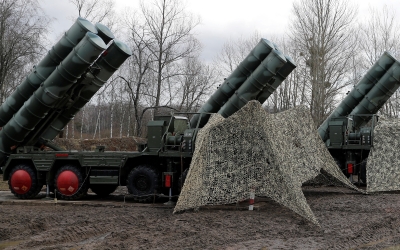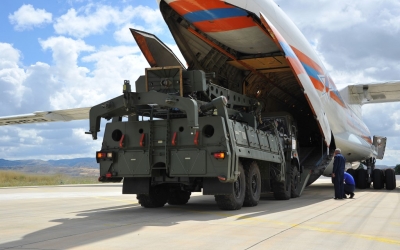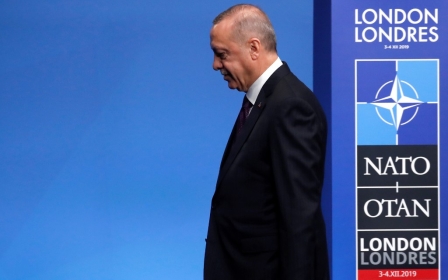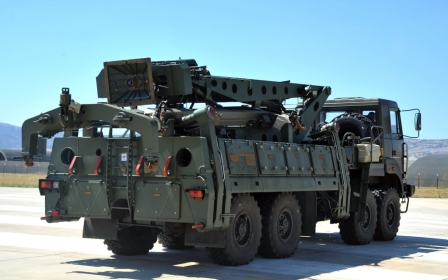US Senators advance Turkey sanctions bill

The Senate Foreign Relations Committee advanced a sanctions bill against Turkey over its military offensive in northern Syria and its purchase of a Russian-made missile system.
The bill passed in the committee on Wednesday in an 18-4 vote. It will now be up to Senate Majority Leader Mitch McConnell, who has been critical of the legislation, to bring it to a full vote on the Senate floor.
If the bill were to pass in the Senate, it would then move on to the House for a vote. If it passed there, US President Donald Trump would then have the option to sign or veto it.
Among other measures, the bill would trigger the Countering America’s Adversaries Through Sanctions Act (CAATSA), under which countries may face US sanctions for entering into arms deals with Russia.
The triggering of CAATSA in Turkey's case would slap Ankara with sanctions over its purchase of the Russian S-400 missile defence system, the first delivery of which arrived in July.
Despite drawn-out pressure from Congress, the Trump administration has yet to impose sanctions on Turkey in accordance with CAATSA.
The bill would also end US support for the Turkish military and impose visa bans on top officials.
In addition to sanctions over the S-400 purchase, the legislation would sanction officials and business leaders involved in Turkey's October incursion into northern Syria.
If passed, top-level officials would have 15 days to brief the appropriate congressional committees regarding Turkey's incursion, including the impact of a US troop withdrawal that took place just before the operation.
The briefs would also include information regarding the Islamic State (IS) group's ability to "reconstitute a physical caliphate", the impact Turkey's incursion has had on Russian and Iranian influence in Syria, and a "comprehensive assessment" of the US's activities to counter those influences, among other points.
Named the "Promoting American National Security and Preventing the Resurgence of ISIS Act", the measure is sponsored by Senate Foreign Relations Committee Chairman Jim Risch, a Republican, and ranking Democrat Bob Menendez.
"This bill makes clear to Turkey that its behavior with respect to Syria is unacceptable, and its purchase of the S400 system is untenable," Menendez said on Twitter following the vote.
The Risch-Menendez legislation closely aligns with a bill that Senator Chris Van Hollen, a Democrat, introduced with Republican Senator Lindsey Graham in October.
"The overwhelming vote underscores the clear desire in Congress to hold President [Recep Tayep] Erdogan accountable for his aggression, which undermines the security of the United States and all of our allies by fueling the revival of [the Islamic State group]," Van Hollen said in a statement after the vote on Wednesday.
"Senator Graham and I have been pushing for action since day one of Turkey’s assault, and we will continue to work in the Senate to get legislation across the finish line that sends a clear signal to Turkey – and anyone else looking to destroy our friends – that there will be severe consequences.”
Concerns over Russian S-400s
US officials have voiced concerns over the Turkish purchase of the Russian S-400 system, stressing that it could undermine the military technology of Turkey's NATO allies - particularly the F-35 jet.
The F-35 fighter jet is being produced in the US as part of a programme involving multiple NATO countries.
Turkey was one of the first members of the F-35 jet programme, partaking and investing more than a billion dollars in its development and sending its pilots to the US for training on the warplanes.
Still, when Turkey received its first delivery of Russia's S-400s in July, Washington cancelled its fighter jet sales to Ankara and expelled the Turkish pilots from training, citing conflicts in running the two weapons systems in tandem.
Last year, the US slapped China with sanctions for buying Russia's S-400 system and Russian-made Su-35 fighter jets. Most recently, Egypt also purchased Su-35s from Russia, prompting the US State Department to threaten Egypt with CAATSA sanctions over the $2bn deal.
The US Senate has also tried and failed on three occasions to pass a resolution that would recognise the Armenian genocide, despite Turkey's objections. The measure is seen as a symbolic statement against Turkey's recent actions.
The House passed a similar measure with strong bipartisan support in late October.
Middle East Eye delivers independent and unrivalled coverage and analysis of the Middle East, North Africa and beyond. To learn more about republishing this content and the associated fees, please fill out this form. More about MEE can be found here.






